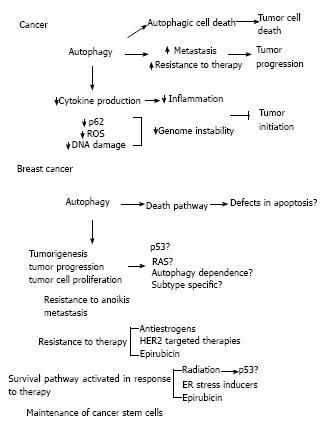Copyright
©2014 Baishideng Publishing Group Inc.
World J Clin Oncol. Aug 10, 2014; 5(3): 224-240
Published online Aug 10, 2014. doi: 10.5306/wjco.v5.i3.224
Published online Aug 10, 2014. doi: 10.5306/wjco.v5.i3.224
Figure 3 Autophagy in cancer and breast cancer.
Different roles have been described for autophagy in cancer. Autophagy can limit tumor initiation by decreasing inflammation and genome instability. Once a tumor is established, autophagy can induce tumor progression by facilitating metastasis and resistance to therapy. On the other hand, it has also been proposed that autophagy could function as a cell death process that could be induced during therapy. In breast cancer, although some evidence suggests that autophagic cell death occurs in apoptosis defective cells, most of the evidence in the literature suggests a tumor promoting role for autophagy. Autophagy has been shown to promote tumorigenesis, tumor proliferation and progression. This could depend on the p53 or RAS mutation status of the cells. Also, if breast cancer is an autophagy-dependent disease remains to be determined as well as if this dependence is subtype specific. Autophagy has also been involved in resistance to anoikis, facilitation of metastasis, resistance to therapy and maintenance of breast cancer stem cells. Moreover, when cancer cells are made resistant to the therapies shown in the figure, they show increased autophagy and inhibition of autophagy reverts this resistance. Therapies that are known to induce autophagy in breast cancer are also shown. With these treatments, autophagy inhibition has been shown to increase cell death. Regarding radiation, results are controversial and the role of autophagy could depend on the p53 status of the cell.
- Citation: Maycotte P, Thorburn A. Targeting autophagy in breast cancer. World J Clin Oncol 2014; 5(3): 224-240
- URL: https://www.wjgnet.com/2218-4333/full/v5/i3/224.htm
- DOI: https://dx.doi.org/10.5306/wjco.v5.i3.224









